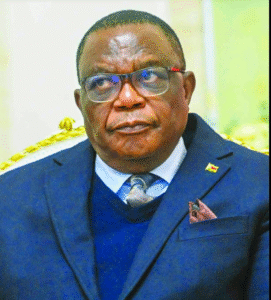GIDEON GONO STRIKES BACK: “NO GOLD WAS STOLEN”

In a fiery response to recent claims, former Reserve Bank of Zimbabwe (RBZ) Governor Dr. Gideon Gono has come out swinging, strongly rejecting accusations that he oversaw the theft of Zimbabwe’s gold during his time in office. Gono is defending his legacy against remarks made by Zanu PF spokesperson Chris Mutsvangwa, who alleged that gold reserves were looted through shady deals with a Saudi Arabian company.
But Gono says there was no gold scandal—just a serious misunderstanding of complex financial operations. According to him, the 2006 deal with the Saudi firm was part of a bigger plan to save Zimbabwe’s economy. At the time, the country was being crushed by Western sanctions that had been imposed in 2002. The $150 million jewelry deal was not gold theft, but part of a strategy to unlock a $600 million credit facility through a South African bank. The money was used to buy critical imports like electricity, fuel, and fertilizer.
Gono insists everything was above board. He says the Anti-Corruption Commission of Zimbabwe (ZACC) already investigated these claims and found nothing wrong. Both he and his successor, John Mangudya, were interviewed, and the paperwork was checked. No missing gold. No illegal deal.
What stings the most for Gono is that Mutsvangwa was not even in the country when the deal happened. At the time, Mutsvangwa was Zimbabwe’s Ambassador to China. Gono says this makes Mutsvangwa unqualified to speak about matters he did not witness or understand. In fact, Gono accuses him of spreading lies that could damage the reputations of individuals and institutions without any evidence to back up his claims.
“These lies, if not challenged, can lead to character assassination and damage the trust Zimbabweans have in our financial institutions,” Gono said.
Gono admits those years were extremely tough. When he became RBZ governor in December 2003, the central bank was flat broke. The economy was bleeding, and sanctions had shut Zimbabwe out of most global financial systems. Gono had to get creative. The jewelry deal was one of several bold moves to keep the country afloat.
He says people who don’t understand what it was like during those sanctions years are quick to judge. “Those who were not involved cannot appreciate the complexity of the decisions we had to make,” Gono explained.
Gono didn’t stop at defending himself—he called for transparency. He challenged President Emmerson Mnangagwa to create a Commission of Inquiry to look into the matter publicly. “Let the truth come out in the open,” he said. “Let Zimbabweans see the documents, the transactions, and the reality of what happened.”
During his time as governor from 2003 to 2013, Gono became one of the most controversial but pivotal figures in Zimbabwe’s economic history. He often took drastic steps to try and manage the country’s collapsed economy, sometimes under intense global pressure. His decisions were bold, sometimes unpopular, but he insists they were necessary.
In the end, Gono says his goal is to defend the truth and make sure Zimbabweans remember history accurately. He wants the public to understand that no gold was stolen and that the RBZ acted within the law. He hopes this will help restore trust in Zimbabwe’s banking system and encourage more thoughtful debate about the country’s past.
This isn’t just about gold or a Saudi deal—it’s about integrity, legacy, and how history is written. And for Gono, the facts speak louder than accusations.



